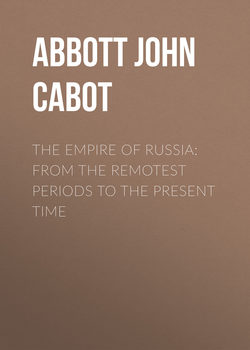The Empire of Russia: From the Remotest Periods to the Present Time

Реклама. ООО «ЛитРес», ИНН: 7719571260.
Оглавление
Abbott John Stevens Cabot. The Empire of Russia: From the Remotest Periods to the Present Time
PREFACE
CHAPTER I. PARENTAGE AND BIRTH OF RUSSIA
CHAPTER II. GROWTH AND CONSOLIDATION OF RUSSIA
CHAPTER III. REIGNS OF VLADEMER, YAROSLAF, YSIASLAF AND VSEVOLOD
CHAPTER IV. YEARS OF WAR AND WOE
CHAPTER V. MSTISLAF AND ANDRÉ
CHAPTER VI. THE GRAND PRINCES OF VLADIMIR, AND THE INVASION OF GENGHIS KHAN
CHAPTER VII. THE SWAY OF THE TARTAR PRINCES
CHAPTER VIII. RESURRECTION OF THE RUSSIAN MONARCHY
CHAPTER IX. DMITRI, VASSALI, AND THE MOGOL TAMERLANE
CHAPTER X. THE ILLUSTRIOUS IVAN III
CHAPTER XI. THE REIGN OF VASSILI
CHAPTER XII. IVAN IV.—HIS MINORITY
CHAPTER XIII. THE REIGN OF IVAN IV
CHAPTER XIV. THE REIGN OF IVAN IV.—CONTINUED
CHAPTER XV. THE ABDICATION OF IVAN IV
CHAPTER XVI. THE STORMS OF HEREDITARY SUCCESSION
CHAPTER XVII. A CHANGE OF DYNASTY
CHAPTER XVIII. THE REGENCY OF SOPHIA
CHAPTER XIX. PETER THE GREAT
CHAPTER XX. CONQUESTS AND ACHIEVEMENTS OF PETER THE GREAT
CHAPTER XXI. THE TRIAL AND CONDEMNATION OF ALEXIS AND DEATH OF THE TZAR
CHAPTER XXII. THE REIGNS OF CATHARINE I. ANNE, THE INFANT IVAN AND ELIZABETH
CHAPTER XXIII. PETER III. AND HIS BRIDE
CHAPTER XXIV. THE CONSPIRACY; AND ACCESSION OF CATHARINE II
CHAPTER XXV. REIGN OF CATHARINE II
CHAPTER XXVI. REIGN OF CATHARINE II
CHAPTER XXVII. TERMINATION OF THE REIGN OF CATHARINE II
CHAPTER XXVIII. THE REIGN OF PAUL I
CHAPTER XXIX. ASSASSINATION OF PAUL AND ACCESSION OF ALEXANDER
CHAPTER XXX. REIGN OF ALEXANDER I
CHAPTER XXXI. NICHOLAS
Отрывок из книги
Those vast realms of northern Europe, now called Russia, have been inhabited for a period beyond the records of history, by wandering tribes of savages. These barbaric hordes have left no monuments of their existence. The annals of Greece and of Rome simply inform us that they were there. Generations came and departed, passing through life's tragic drama, and no one has told their story.
About five hundred years before the birth of our Saviour, the Greeks, sailing up the Bosphorus and braving the storms of the Black Sea, began to plant their colonies along its shores. Instructed by these colonists, Herodotus, who wrote about four hundred and forty years before Christ, gives some information respecting the then condition of interior Russia. The first great irruption into the wastes of Russia, of which history gives us any record, was about one hundred years before our Saviour. An immense multitude of conglomerated tribes, taking the general name of Scythians, with their wives and their children, their flocks and their herds, and their warriors, fiercer than wolves, crossed the Volga, and took possession of the whole country between the Don and the Danube. These barbarians did not molest the Greek colonies, but, on the contrary, were glad to learn of them many of the rudiments of civilization. Some of these tribes retained their ancestral habits of wandering herdsmen, and, with their flocks, traversed the vast and treeless plains, where they found ample pasture. Others selecting sunny and fertile valleys, scattered their seed and cultivated the soil. Thus the Scythians were divided into two quite distinct classes, the herdsmen and the laborers.
.....
Three brothers, named Rurik, Sineous and Truvor, illustrious both by birth and achievements, consented to assume the sovereignty, each over a third part of the united applicants; each engaging to coöperate with and uphold the others. Escorted by the armed retinue which had come to receive them, they left their native shores, and entered the wilds of Scandinavia. Rurik established himself at Novgorod, on lake Ilmen. Sineous, advancing some three hundred miles further, north-east, took his station at Bielo Ozero, on the shores of lake Bielo. Truvor went some hundred miles further south to Truvor, in the vicinity of Smolensk.
Thus there were three sovereigns established in Russia, united by the ties of interest and consanguinity. It was then that this region acquired the name of Russia, from the Norman tribe who furnished these three sovereigns. The Russia which thus emerged into being was indeed an infant, compared with the gigantic empire in this day of its growing and vigorous manhood. It embraced then but a few thousand square miles, being all included in the present provinces of St. Petersburg, Novgorod and Pskov. But two years passed away ere Sineous and Truvor died, and Rurik united their territories with his own, and thus established the Russian monarchy. The realms of Rurik grew, rapidly by annexation, and soon extended east some two hundred miles beyond where Moscow now stands, to the head waters of the Volga. They were bounded on the south-west by the Dwina. On the north they reached to the wild wastes of arctic snows. Over these distant provinces, Rurik established governors selected from his own nation, the Normans. These provincial governors became feudal lords; and thus, with the monarchy, the feudal system was implanted.
.....